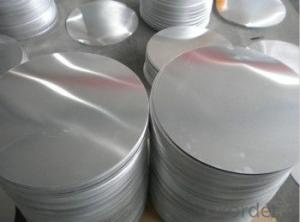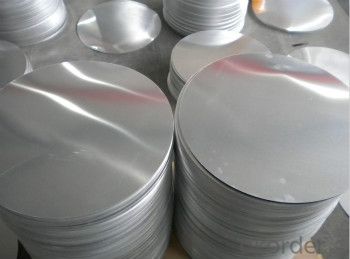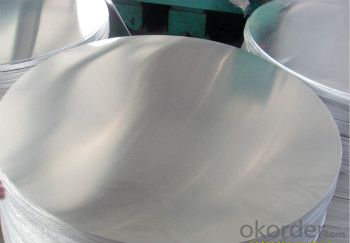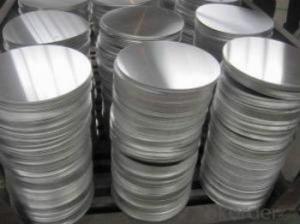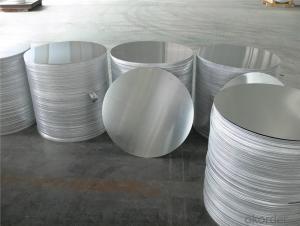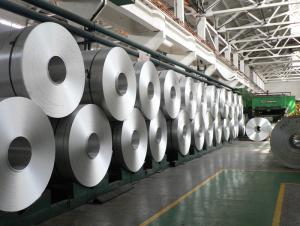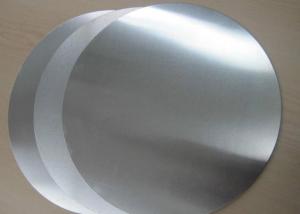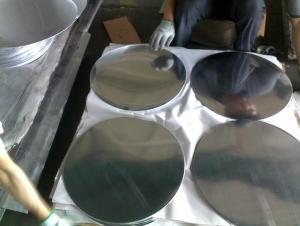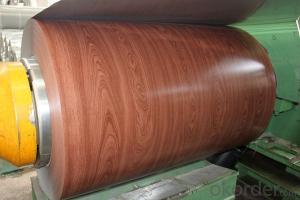Black Aluminum Coil Stock Continuous Casting Aluminium Circle AA3003
- Loading Port:
- Shanghai
- Payment Terms:
- TT OR LC
- Min Order Qty:
- 5 m.t.
- Supply Capability:
- 2000 m.t./month
OKorder Service Pledge
OKorder Financial Service
You Might Also Like
Specification
1. Structure of CC Aluminium in Coil Form for making Aluminium Circle Description
CC Aluminium in Coil Form for making Aluminium Circle is one semi-finished aluminium material. This coil can be rolled down to aluminium coil,sheet,circle ect. The alloy AA1050 is widly used in building, industry ect. Its weight is much lower than steel. So many customers choosed aluminium material instead of steel.
2. Feature of CC Aluminium in Coil Form for making Aluminium Circle
Surfact Quality :
Be free from Oil Stain, Dent, Inclusion, Scratches, Stain, Oxide Dicoloration, Breaks, Corrosion, Roll Marks, Dirt Streaks and other defect which will interfere with use,
Mechenical Property:
Chemical Composite and Mechanical Property
3. Image of CC Aluminium in Coil Form for making Aluminium Circle
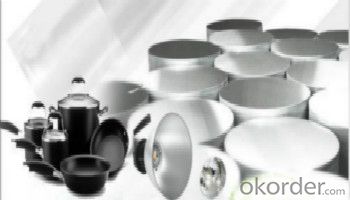
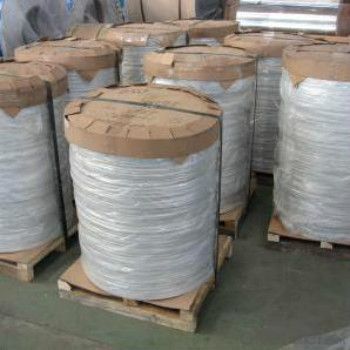
4. Specification of CC Aluminium in Coil Form for making Aluminium Circle
Aluminum Coil/Sheet | |
Main Specification | |
Alloy | AA1xxx (AA1050, AA1060, AA1070, AA1100 etc.) |
AA3xxx (AA3003, AA3004, AA3005, AA3105 etc.) | |
AA5xxx, AA6XXX (AA5052,AA5083, AA5754, AA6061, AA6062 etc.) | |
AA8xxx(AA8011, AA8006 etc.) | |
Temper | H14,H16, H18, H22, H24, H26, H32,O/F, T4, T6, T651 |
Thickmess | 0.01mm-100mm |
Width | 30mm-1700mm |
Standard | GB/T 3880-2006/ASTM |
Special specification is available on customer's requirement | |
5. FAQ
1) What is the delivery time?
Depends on actual order, around 20 to 35 days
2) What is the QC system:
We have QC staff of 20 persons and advanced equipment, each production is with MTC traced from Aluminum ingot lot.
3) What market do you mainly sell to?
Australia, America, Asia, Middle East, Western Europe, Africa etc
4)What about payment term?
30% T/T in advance, balance against B/L COPY.
- Q: What substances are used to make aluminum coils?
- <p>Aluminum coils are made from aluminum, a lightweight and malleable metal with the chemical symbol Al. They are typically produced from high-purity aluminum or aluminum alloys, which may include small amounts of other elements to enhance specific properties such as strength, durability, or resistance to corrosion. Pure aluminum is soft and lacks strength, so alloys are often used to improve these characteristics for various applications.</p>
- Q: Can aluminum coils be used in marine environments?
- Yes, aluminum coils can be used in marine environments. Aluminum is widely used in marine applications due to its excellent corrosion resistance properties. It forms a protective oxide layer that prevents further oxidation and corrosion, making it suitable for various marine equipment and structures.
- Q: Is it possible to use a crowbar as a tool for opening an aluminum coil?
- <p>While a crowbar can be used to apply force to open various objects, it may not be the most suitable tool for opening an aluminum coil. Aluminum coils can be sharp and using a crowbar could lead to injury or damage to the coil. It's recommended to use gloves and a pair of pliers or a coil cutter specifically designed for handling aluminum coils to ensure safety and avoid damaging the material.</p>
- Q: What are the differences between aluminum coil 3003h24 and 3a21h14?
- The mechanical property references of rolled plate 3003 H24and 3A21 H14 are as follows: 3003 H24--Rm/MPa≧140-180;Rp0.2/MPa≧115;A(%)≧1-5(thickness 0.2mm-4.5mm)3A12 H14--Rm/MPa≧145-215;A(%)≧6
- Q: What are the common transportation methods for aluminum coils?
- The common transportation methods for aluminum coils include trucking, rail shipping, and shipping via container vessels.
- Q: I read the back of my deodorant and it said that it contains 14% Aluminum. Is that harmful for my baby?
- It's probably an anti-perspirant, right? That blocks sweat glands and is not healthy for you; not sure about the baby. You should only use deodorant - not anti-perspirant.
- Q: How are aluminum coils tested for thickness and flatness?
- Aluminum coils are typically tested for thickness and flatness using specialized equipment such as a thickness gauge and a flatness tester. The thickness gauge measures the thickness of the coil at various points to ensure it meets the required specifications. Meanwhile, the flatness tester uses laser technology or a similar method to measure the surface flatness of the coil, identifying any deviations or irregularities. These tests are crucial to ensure the quality and consistency of the aluminum coils before they are further processed or used in various applications.
- Q: What are the different width tolerances for aluminum coils?
- The width tolerances of aluminum coils may differ based on specific requirements and industry standards. Typically, the range of tolerances is between +/- 0.005 inches and +/- 0.25 inches. Nevertheless, the intended use of the aluminum coils may necessitate stricter requirements or more lenient tolerances in certain applications. To ascertain the precise width tolerances for a particular application, it is vital to refer to the manufacturer's specifications and guidelines or industry standards.
- Q: How do aluminum coils impact energy efficiency?
- Aluminum coils play a vital role in enhancing energy efficiency across various applications, such as heating, ventilation, and air conditioning (HVAC) systems, refrigerators, and heat pumps. The outstanding heat transfer properties of aluminum are the primary reason for their positive impact on energy efficiency. The excellent heat conductivity of aluminum enables it to quickly absorb and release thermal energy. In HVAC systems, aluminum coils effectively transfer heat between the indoor and outdoor units. This efficient heat transfer reduces the system's workload, enabling it to operate more efficiently and consume less energy. Moreover, aluminum coils possess the advantages of being lightweight and having a large surface area, further enhancing their heat transfer capabilities. By reducing the overall weight of the system, their lightweight nature results in lower energy consumption. The increased surface area promotes better contact between the air and the coils, facilitating more effective heat exchange. Another benefit of aluminum coils is their resistance to corrosion, a common issue in HVAC systems. Corrosion can hinder the efficiency of heat transfer, leading to increased energy consumption. The corrosion resistance of aluminum coils ensures long-lasting performance, maintaining their efficiency and reducing the need for frequent maintenance or replacement. To summarize, aluminum coils significantly contribute to energy efficiency by facilitating efficient heat transfer, reducing the workload on HVAC systems, and minimizing energy consumption. Their lightweight nature, large surface area, and corrosion resistance further enhance their positive impact on energy efficiency.
- Q: How are aluminum coils used in the manufacturing of signage?
- Aluminum coils are widely used in the manufacturing of signage due to their numerous beneficial properties. These coils are typically made from high-quality aluminum alloy, which offers excellent corrosion resistance and durability, making them ideal for outdoor applications. The first step in using aluminum coils for signage manufacturing is the process of coil slitting. This involves cutting the large aluminum coils into smaller, more manageable sizes that can be easily shaped and formed to meet specific design requirements. This slitting process ensures that the coils are the right width and thickness for the desired signage application. Once the coils are properly sized, they are typically fed into a roll-forming machine. This machine allows for the precise shaping of the aluminum coils into the desired signage profiles, such as flat panels, letters, or channel letters. The flexibility of aluminum allows for intricate and customized designs to be easily achieved. Aluminum offers great versatility in terms of finishing options. The coils can be coated with various protective finishes, such as polyester or PVDF coatings, which provide enhanced durability and resistance to fading, chipping, or peeling. These finishes also allow for a wide range of color choices, enabling signage manufacturers to create eye-catching and vibrant displays. Furthermore, aluminum coils are lightweight, making them easier to handle during the fabrication process and reducing transportation costs. Their lightweight nature also makes them suitable for mounting on various surfaces, such as walls, poles, or freestanding structures. In summary, aluminum coils play a crucial role in the manufacturing of signage by providing a durable, corrosion-resistant, lightweight, and versatile material. They can be easily shaped and formed to create customized designs, and their protective finishes ensure long-lasting and visually appealing signage displays.
Send your message to us
Black Aluminum Coil Stock Continuous Casting Aluminium Circle AA3003
- Loading Port:
- Shanghai
- Payment Terms:
- TT OR LC
- Min Order Qty:
- 5 m.t.
- Supply Capability:
- 2000 m.t./month
OKorder Service Pledge
OKorder Financial Service
Similar products
Hot products
Hot Searches
Related keywords
